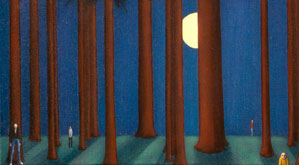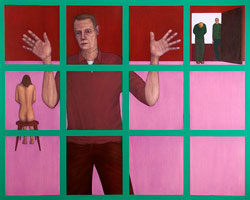|
|
||||||||||||||||||||||||||||||||||||||||||||||||||||||||||||||||||||||||||||||
 |
 "He reaches down and stirs up with venomous delight the nameless, faceless things swimming far below the levels of consciousness."
The Scotsman  "He has located a territory of his own... a state of hard-won calm continually bordering calamity"
(The Times, London) "The master of modern horror." (The Sunday Times, London) Hugh Fleetwood's art is paradoxical: both consoling and disturbing. It consoles, since it is clearly within the great tradition of Western European painting, with a harmony of form and use of colour that any admirer of that tradition might recognize. It disturbs, since for all its surface beauty, its subject matter tends to subvert the very idea of beauty; to suggest horror, discord and a world at odds with itself, and with its own traditions. It is this combination of Beauty and the Beast that gives the work its power; and ensures that while it is never likely to be "fashionable", it is equally likely never to pass out of fashion. An art of then and now; and an art for now - and then.  Painter, novelist, poet, HUGH FLEETWOOD was born in England in 1944. At the age of 18 he went to live in France; at 21, he moved to Italy, where he remained for the next fourteen years. He had his first exhibition in 1970 at the Festival dei Due Mondi, in Spoleto; the year after, he published his first novel, A Painter of Flowers, for which he also designed the jacket. His second novel, The Girl Who Passed for Normal, won the John Llewellyn Rhys Memorial Prize; his fifth, The Order of Death, was made into a film - Corrupt in the U.S. - starring Harvey Keitel and John Lydon (Johnny Rotten). In all he has published twenty-two books, and amongst other things has been called one of the key authors in the history of the British and Irish short story. After his return to England, Hugh Fleetwood had three further one-man shows of his paintings: two at the St. Raphael Gallery in London, and one at The Calvert Gallery. He also designed the jacket for his last novel, The Dark Paintings, and for a republication of one of his earlier books, Foreign Affairs. He currently lives in London.
 The following few poems are taken from Fleetwood’s complete poetry collection, also entitled Sketches & Reflections. They in no way illustrate his paintings; they might, possibly, illuminate them.
I’M NOT SURE MYSELF
I’M NOT SURE MYSELF
THE ROMANTIC IMAGE WHAT OTHER FOLK MEAN A MASKED BALL TREKKING TO Mt. OLYMPUS THE POET GIVES HIS FRIEND WILDFLOWERS IT WAS A BEAUTIFUL SUMMER'S EVENING How glorious are the murderers, (Ah the virtue they bequeath, So let’s hear it for pogroms and slaughter, Travellers,
Love was willing to partner him, How pious he looked as he led her around, They’ll probably be asleep when you get there. Pale blue and delicate, they smelled both sweet and faintlyof death. "Thank you," she said, "they're beautiful." Yet, perhaps just because they were - or because of that unsettling scent - although she smiled as she took them, her eyes expressed a certain fear. As if she'd been reminded she had always found him chilly, and he liked to say that beauty, and art, required sacrifice. Still, monster or no, she had loved him for many years, and she was grateful and touched by the gift. So she tried to mask her disquiet, and didn't insist when she asked where he had found them - and he replied, "Oh, you know," and gave a vague, uncomfortable wave... Shortly after, he left, looking sad, but relieved she hadn't pressed him; that he hadnt had to tell her he had picked those flowers from her grave. IL POETA DA FIORI DI CAMPO ALL'AMICA D'un azzurro pallido, e delicati, Odoravano sia di dolce Che di morte. "Grazie" lei disse. "Sono bellissimi." Ma forse proprio perche lo erano - O per via di quel profumo disturbante - Sebbene sorridesse mentre li prendeva, I suoi occhi mostravano una certa Paura. Come si fosse ricordata Che l'ha sempre trovato freddo, E che gli piaceva sostenere che la bellezza, E l'arte, Richiedono sacrifici. Comunque, mostro o no, L'ha amato per molti anni, Ed era commossa, E grata per il dono. Percio, ha cercato di mascherare la sua Inquietudine, E non ha insisto quando gli ha chiesto Dove li aveva trovati - Ed ha risposto, "0, sai..." E ha fatto un vago, imbarazzato gesto. Poco dopo se ne ando, Con l'aria triste, ma sollevato Che non ha ripetuto la domanda; Che non ha dovuto dirle Che ha raccolto quei fiori Dalla sua tomba. IT WAS A BEAUTIFUL SUMMER'S EVENINGIt was a beautiful summer's evening: the sky still faintly blue, a gentle breeze and the crickets clacking in the trees… The times, as ever, were out of joint. But those assembled did the best they could and tried, on the whole, to remain good- humoured. They saw no point in constantly wringing their hands and weeping over things they could do little about. So when one of their number started to shout and insisted on people keeping their eyes fixed firmly on "the truth," they begged him to turn the volume down. They weren't deaf or blind, they said, and they'd known what he was telling them for years – indeed, since youth. Speak softly, they went on, and please, let us just bask in the last rays of the sun, lie back and enjoy these final days of summer, the crickets and the evening breeze. Of course, they concluded, beauty isn’t all; but it will soon enough be fall. Hugh FleetwoodE-mail: H.N.Fleetwood@btinternet.com |
